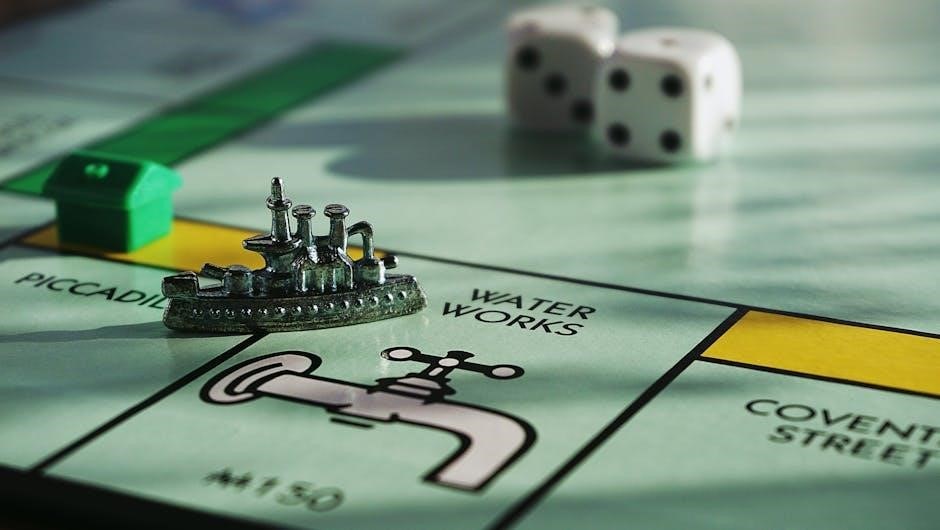monopoly deal rules pdf
Objective of the Game
The goal is to be the first player to collect three full property sets of different colors. Use action cards strategically to disrupt opponents and achieve victory.
1.1. Aim of the Game
The aim is to collect and strategically use cards to outsmart opponents. Players focus on gathering property sets and using action cards to disrupt others. The goal is to build a strong collection while undermining opponents’ progress. Action cards like Deal Breaker and Sly Deal can steal properties or block opponents, adding a tactical layer. Balancing card usage and property collection is key to winning. The game requires both luck and strategy to emerge victorious.
1.2. Winning Conditions
To win, a player must be the first to collect three full property sets of different colors. These sets must be placed on the table, and each set must consist of all properties in a specific color group. Additionally, players can win by forcing all opponents to run out of money or by using action cards to take control of the game. The game ends immediately when a player meets one of these conditions, making them the winner. Strategy and card management are crucial to achieving these winning conditions efficiently.

Setup and Preparation
Remove Quick Start cards, shuffle the deck, and deal five cards to each player. Ensure all players have their cards face down initially.
2.1. Removing Quick Start Cards
The first step in setting up the game is to remove the four Quick Start cards from the deck. These cards are designed to provide a quick reference guide for players. After removing them, hand out one Quick Start card to each player to help them understand the basic rules and objectives. This ensures everyone is familiar with the gameplay before starting. Once distributed, the remaining cards are shuffled and prepared for dealing. This step ensures a smooth and informed start to the game.
2.2. Shuffling and Dealing Cards
After removing the Quick Start cards, shuffle the remaining deck thoroughly to ensure randomness. Once shuffled, deal five cards to each player, face down. This ensures each player begins with an equal number of cards and a fair chance to strategize. The deck is then placed within reach of all players, and the remaining cards are prepared for drawing during the game. Proper shuffling and dealing are crucial to maintaining fairness and unpredictability in the gameplay experience. This step sets the stage for an exciting and balanced start to the game.
2.3. Initial Card Distribution
After shuffling, each player is dealt five cards face down. This ensures a fair start for everyone. The remaining cards are placed face down in a draw pile. Players should not reveal their cards during distribution. The Quick Start cards, previously removed, are used as reference guides for gameplay rules. This initial distribution sets the stage for strategic planning and gameplay. Ensuring all players have their cards before proceeding maintains fairness and excitement. Proper distribution is essential for a smooth and enjoyable game experience.
Understanding the Deck
The deck consists of Action Cards, Property Cards, Wild Cards, and Rent Cards. Each type serves a unique role in gameplay, from disrupting opponents to building property sets strategically.
3.1. Types of Cards in Monopoly Deal
The Monopoly Deal deck contains several types of cards, each with unique functions. Action Cards include Deal Breaker, Sly Deal, and Force Deal, allowing players to disrupt opponents. Property Cards are colored and grouped into sets, which players aim to collect. Wild Property Cards can substitute for any color to complete sets. Additionally, Rent and House Cards increase the rent value of properties. Understanding each card type is crucial for strategic gameplay and achieving victory by completing three property sets first.
3.2. Action Cards Explained
Action Cards in Monopoly Deal are powerful tools that allow players to disrupt opponents or gain advantages. There are 34 Action Cards in total, including Deal Breaker, Just Say No, Sly Deal, Force Deal, Debt Collector, and It’s My Birthday. These cards enable actions like stealing properties, cancelling deals, or collecting debts. Players can use them strategically to interfere with opponents’ progress or protect their own assets. Action Cards add unpredictability and excitement to the game, making them essential for competitive play. Understanding their effects is key to leveraging them effectively during gameplay.
3.3. Property Cards and Their Roles
Property Cards are central to Monopoly Deal, representing real estate that players collect to form sets. Each card features a property name, color group, and rental value. Collecting three properties of the same color allows you to charge rent. These cards are crucial for meeting the game’s objective of gathering three complete sets. Players can strategically place properties on the table to showcase their collections and progress towards winning. Properly managing and protecting these cards is essential for success in the game, as they directly contribute to achieving the victory condition.
3.4. Wild Property Cards
Wild Property Cards are versatile and can act as any property color to help complete sets. They are valuable for filling gaps in collections but do not increase rental income. Players can strategically use Wild Cards to complete sets or hold them to adapt to changing circumstances. These cards add flexibility to gameplay, allowing players to adjust their strategy dynamically. However, they are limited in number, making them a valuable resource that requires careful use. Wild Cards enhance the tactical depth of the game, enabling players to pivot their approach as needed.
3.5. Rent and House Cards
Rent and House Cards significantly enhance gameplay by increasing the income potential of properties. Rent Cards allow players to charge higher rent when placed on properties, while House Cards and Hotel Cards further amplify rental values. These cards are essential for maximizing profit and pressuring opponents financially. Players can strategically place them on their most valuable properties to boost earnings. The combination of Rent, House, and Hotel Cards creates a dynamic economic layer, making property ownership even more advantageous. These cards are crucial for building wealth and driving opponents toward bankruptcy, adding depth to the game’s strategic elements.
Action Cards in Detail
Action Cards enable players to perform specific actions, such as charging rent, making deals, or collecting money from opponents. They add a strategic layer to gameplay.
4.1. Types of Action Cards
Action Cards in Monopoly Deal include Deal Breaker, Just Say No, Sly Deal, Force Deal, Debt Collector, and It’s My Birthday. These cards enable unique actions like stealing properties, canceling rent, or collecting money. There are 34 Action Cards in total, with varying quantities for each type. For example, there are 2 Deal Breaker cards and 3 Just Say No cards. Each Action Card also has a monetary value, allowing players to use it as money if not played. These cards add strategic depth and excitement to the game.
The Deal Breaker card is a powerful Action Card that allows you to steal a completed property set from another player. This card can be played during your turn, and it forces the targeted player to hand over their entire set. With only 2 Deal Breaker cards in the deck, using it strategically can change the game’s momentum. It’s particularly effective against opponents close to winning, making it a valuable asset in your strategy. Use it wisely to disrupt opponents and accelerate your path to victory. The Just Say No card is a defensive Action Card that allows you to cancel certain actions initiated by other players. Specifically, it can counter Charge Rent or Sly Deal actions, protecting your properties and funds. With 3 Just Say No cards in the deck, it’s essential to use them at critical moments to avoid losing money or properties. This card provides a strategic way to disrupt opponents’ plans and maintain control over your assets. Timing its use effectively can greatly enhance your chances of winning the game. The Sly Deal card is a powerful Action Card that allows you to steal a property from another player without paying them. To use it, you must have at least one property card of the same color as the one you’re targeting. This card is particularly strategic, as it lets you expand your collection while weakening your opponent’s. There are 3 Sly Deal cards in the deck, making them a valuable asset when played at the right moment. Use it wisely to gain an advantage and move closer to completing your property sets. Timing is key to maximize its impact.
The Force Deal card is a strong Action Card that compels another player to give you one of their properties. You can choose any property they own, making it a great way to complete your sets. There are 4 Force Deal cards in the deck, increasing your chances of acquiring it. This card is especially useful for targeting specific properties needed to finish a set. Use it strategically to strengthen your position and pressure opponents. Timing is crucial, as it can turn the tide of the game in your favor quickly. Play it wisely to maximize its effectiveness. The Debt Collector card forces another player to pay you a specific amount of money, depending on the card’s value. This can disrupt their finances and benefit yours. There are 3 Debt Collector cards in the deck, making them relatively rare but impactful. Use this card to weaken opponents’ resources, limiting their ability to play Action Cards or acquire properties. It’s particularly effective when opponents have accumulated wealth, allowing you to gain an advantage. Timing its use wisely can significantly strengthen your position while undermining others’, making it a valuable asset in your strategy. Play it when it hurts the most. The It’s My Birthday card is a unique and fun Action Card that allows you to celebrate by collecting $1 from each player in the game. This card is an excellent way to quickly accumulate funds, especially when multiple opponents are present. Played strategically, it can replenish your resources or hinder others’ progress. With only 3 It’s My Birthday cards in the deck, it’s a rare but impactful addition to your hand. Use it wisely to maximize its benefits and gain an advantage over your opponents. Timing is key to make the most of this festive card. Property cards are central to the game, representing real estate that can be collected to form valuable sets. They come in different colors and include wild cards to help complete sets. Collecting these strategically is key to winning. To win in Monopoly Deal, you must collect three full property sets of different colors. Each set consists of all properties in a specific color group. Players can use wild property cards to complete sets, adding flexibility to their strategy. Organizing your properties by color and tracking your progress is essential. Action cards like Sly Deal or Force Deal can help acquire missing properties or disrupt opponents. The goal is to complete sets efficiently while preventing others from doing the same. The first player to lay down three complete sets wins the game. Strategy and timing are key! In Monopoly Deal, properties are grouped by color, representing different sets. Each color group contains specific properties that must be collected to complete a set. The colors help players organize and track their collections. Some colors are rarer or have fewer properties, making them harder to complete. Understanding the color distribution aids in strategizing which sets to pursue first. The goal is to complete three distinct color sets to win, making color recognition and prioritization crucial for success. This system ensures the game is both challenging and strategic. Wild Property Cards are versatile and can substitute for any property or color, helping complete sets. Use them to fill gaps in your collection or adapt to changing circumstances. Timing is key—hold Wild Cards until they are most beneficial. They can also be used to block opponents by completing a set before they can. Effective use of Wild Cards can accelerate your progress and give you a strategic edge, enabling you to complete sets faster and outmaneuver opponents. This flexibility makes Wild Cards invaluable in achieving victory. Play alternates clockwise, with each turn involving drawing, playing, and resolving cards. Manage your hand effectively to execute actions, place properties, and charge rent strategically. At the start of each turn, draw one card from the deck. If you have fewer than five cards at the end of your turn, draw until you have five. Action cards like “It’s My Birthday” may require other players to draw cards, while “Just Say No” can prevent drawing. Drawing is a critical mechanic that replenishes your hand and enables strategic plays. Ensure you understand when and how to draw to maintain a strong position in the game. Proper card management is essential for success. Action cards can be played during your turn to disrupt opponents or gain an advantage. Each action card has specific instructions, such as Deal Breaker or Sly Deal, which allow you to take control of properties or force opponents to pay. These cards can be used strategically to change the game’s momentum. For example, a Drew a “Debt Collector” card can force another player to pay you money. Timing is crucial, as playing the right action card at the right moment can significantly impact your chances of winning. Always consider when to hold or play action cards to maximize their effectiveness. To place a property, lay down a card from your hand that matches an empty spot in your collection. You can place multiple properties per turn, but they must align with your collection’s requirements. Properties can be placed strategically to complete sets or block opponents. Placing a property allows you to charge rent once the set is complete. Timing is key—placing properties early can build momentum, while waiting might let opponents disrupt your plans. Always aim to maximize your property placements to quickly complete sets and gain a competitive edge. Rent is charged when you have a complete set of properties in a specific color group. Place the completed set in front of you and announce the rent value from the property card. Rent values increase with house and hotel cards. Use wild property cards strategically to complete sets. You can charge rent during your turn or when an opponent lands on your property. Action cards like Debt Collector can also force opponents to pay rent immediately. Effective rent charging can deplete opponents’ funds and accelerate your path to victory. Timing and strategy are crucial to maximize rent collection. After playing your cards and performing actions, your turn ends. You must discard any cards you played or used during your turn. Ensure you have no more than five cards in your hand by discarding extras. The next player then begins their turn clockwise. Ending your turn promptly keeps the game flowing smoothly. Properly managing your cards and actions is essential to maintain game balance and fairness. Always follow the sequence of play to ensure a seamless transition to the next player. Efficiently ending your turn is crucial for maintaining the game’s pace and enjoyment. Players charge rent using property cards, with values increasing when houses or hotels are added. Payments are made using money cards or action cards as specified. Rent is determined by the value listed on property cards. When a player places a property card, they can charge rent if they have a complete set of that color. House and hotel cards increase rent values. Players must pay rent using money cards or action cards with monetary values. Action cards like Debt Collector can also force opponents to pay. Rent payments are a key mechanic for gaining an advantage and depleting opponents’ funds. Understanding rent dynamics is crucial for strategic play and winning the game. To charge rent, players must first lay down property cards. When a player places a property, they can only charge rent if they complete a full set of that color. Wild cards can substitute for missing properties to complete a set. Once a set is complete, the player can charge rent according to the value listed on the property cards. Rent payments are made using money cards or action cards with monetary values. Players can also use Action Cards like Debt Collector to enforce payments. Properly managing properties and rent is essential for strategic gameplay. In Monopoly Deal, debts are typically incurred when a player is charged rent or targeted by certain action cards like Debt Collector. To pay debts, players must use money cards or action cards that have specific monetary values. If a player cannot pay the required amount, they are eliminated from the game. It’s important to manage debts wisely, as failure to pay can lead to losing the game. Strategic use of Debt Collector cards can also force opponents into difficult financial situations, potentially leading to their elimination. Proper debt management is crucial for maintaining financial stability and staying competitive. Players should prioritize acquiring and maintaining sufficient funds to cover unexpected debts, ensuring they remain in the game. This careful balance between spending and saving is key to success in Monopoly Deal. Focus on building a strong collection of properties and use action cards to disrupt opponents. Manage your bankroll wisely to stay competitive and secure wins. To build a strong collection, focus on acquiring property sets of the same color. Prioritize completing sets with higher rental values first, as they provide greater income. Use wild cards strategically to fill gaps in your sets. Pay attention to opponents’ moves to avoid losing key properties. Diversify your collection to ensure you have multiple sets in progress. This approach maximizes your chances of being the first to collect three complete sets, securing your win. Always balance property collection with action card usage to maintain control. Action cards are powerful tools to disrupt opponents and gain an advantage. Use Deal Breaker to steal a property set or Sly Deal to swap hands. Play Deduct Collector to force opponents to pay you. Timing is crucial; use Just Say No to block rent demands. Force Deal can make opponents give up properties. Save action cards for critical moments, such as when an opponent is close to completing a set. Balancing action card usage with property collection is key to outsmarting your opponents and securing victory. Effectively managing your bank is crucial for long-term success. Always retain a cash reserve to pay rent and debts. Use action cards like Deduct Collector to gain money from opponents. Avoid spending all your cash at once, as unexpected rent demands can force you to discard properties. Prioritize purchases and save money for strategic moves. Balancing property collection with financial stability ensures you can withstand opponents’ actions and maintain control throughout the game; Smart banking keeps you competitive and prepared for any situation. Overextending resources and ignoring opponents’ moves are frequent errors. Players often neglect action cards and fail to monitor others’ property sets, leading to defeat.
Players often exhaust their bank by paying debts or charging unnecessary rents. Overusing action cards early can leave you vulnerable later. Conserve resources to maintain flexibility. Properly manage your money and cards to avoid financial strain. Balancing spending and saving is key to staying competitive. Avoid risky moves that deplete your funds, ensuring you can respond to opponents’ actions. Strategize your expenditures to maximize your chances of winning without overextending. This approach helps maintain a strong financial position throughout the game. Failing to monitor opponents’ actions can lead to losing valuable properties or money. Ignoring their strategies allows them to gain an advantage, potentially completing sets or using action cards against you. Stay alert to their card plays, property placements, and rent charges. Observing opponents helps you anticipate their moves and disrupt their plans. Missing these cues can result in missed opportunities to interfere with their progress. Always track opponents’ actions to adapt your strategy and maintain control of the game. Vigilance is crucial to outsmarting competitors and securing victory. Download the official Monopoly Deal rules PDF for comprehensive instructions. Explore online tutorials and guides for tips, strategies, and detailed gameplay explanations to enhance your playing experience. The official Monopoly Deal rules PDF is available for download from the Hasbro website or authorized sources. It provides detailed instructions, setup guides, and gameplay rules. Online tutorials and guides provide step-by-step instructions for mastering Monopoly Deal. Websites like YouTube and strategy forums offer video guides and detailed breakdowns of card types, property collection, and winning strategies. These resources are ideal for both new players and veterans looking to refine their gameplay. Many guides focus on optimal uses of action cards and how to build strong property sets. They also cover advanced tactics, such as managing your bank and predicting opponents’ moves. Use these resources to enhance your skills and improve your chances of winning.4.2. Deal Breaker Card
4;3. Just Say No Card
4.4. Sly Deal Card
4.5. Force Deal Card
4.6. Debt Collector Card
4.7. It’s My Birthday Card
Property Cards and Collection
5.1. Collecting Property Sets
5.2. Different Colors and Their Significance
5.3. Using Wild Cards Strategically

Gameplay Mechanics
6.1. Drawing Cards
6.2. Playing Action Cards
6.3. Placing Properties
6.4. Charging Rent
6.5; Ending Your Turn
Rent and Payments
7.1. How Rent Works
7.2. Using Properties to Charge Rent
7.3. Paying Debt

Strategy and Tips
8.1. Building a Strong Collection
8.2. Using Action Cards Effectively
8.3. Managing Your Bank

Common Mistakes to Avoid
9.1. Overextending Your Resources
9.2. Not Paying Attention to Opponents’ Moves
Additional Resources
10.1. Downloading the Official Rules PDF
This PDF ensures clarity on winning conditions, card types, and strategies. It’s essential for new players to understand the mechanics and veterans to refine their tactics.
Download the PDF to access a comprehensive guide that covers property collection, action cards, and rent rules. Ensure you get it from trusted sources to avoid errors or incomplete information.10.2. Online Tutorials and Guides
